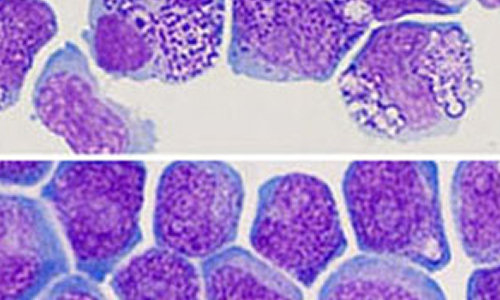The Institute for Research in Immunology and Cancer (IRIC) at the Université de Montréal (UdeM), in collaboration with the Maisonneuve-Rosemont Hospital’s Quebec Leukemia Cell Bank, recently achieved a significant breakthrough thanks to the laboratory growth of leukemic stem cells, which will speed up the development of new cancer drugs.
Top: Acute myeloid leukemia cells presenting anomalies in standard growth conditions. Below: Acute myeloid leukemia cells preserving their leukemic cell features following in vitro culture with the two chemical molecules referred to in the study cited.
In a recent study published in Nature Methods, the scientists involved describe how they succeeded in identifying two new chemical compounds that allow to maintain leukemic stem cells in culture when these are grown outside the body.
This important advance opens the way to the identification of new cancer drugs to fight acute myeloid leukemia, one of the most aggressive forms of blood cancer.
The ability to grow leukemic stem cells in culture is a major breakthrough. The next step is to study the molecular mechanisms that regulate the survival and proliferation of leukemic cells as well as the resistance to cancer drugs.
This study is the work of the “Leucégène” research group. This group is co-directed by Dr. Guy Sauvageau, chief executive officer and principal investigator at IRIC as well as professor in the Department of Medicine at the UdeM; by Dr. Josée Hébert, director of the Quebec Leukemia Cell Bank, hematologist at Maisonneuve-Rosemont Hospital and professor in the Department of Medicine at the UdeM; and by Sébastien Lemieux, principal investigator at IRIC. The first author of the study is Caroline Pabst, a postdoctoral fellow at IRIC and associate of the “Leucégène” research group.
“This research breakthrough demonstrates the advantage of working in a multidisciplinary team like the ‘Leucégène’ research group,” stated Drs. Sauvageau and Hébert. “Access to cells of leukemia patients and to IRIC’s state-of-the-art facilities are also key factors in pursuing ground-breaking research.”
Background to the study
Stem cells located in the bone marrow are responsible for the production of blood cells. Unfortunately, deregulation of those cells often produces disastrous consequences when one of them develops mutations that transform it into a malignant cell called “leukemic”. The result is an abnormal proliferation of blood cells and the development of leukemia. Leukemic stem cells are also one of the likely causes of patient relapse because they are especially resistant to cancer treatments.
The major obstacle before this discovery was growing stem cells and keeping them intact in vitro, because they quickly lost their cancer stem cell character. As a result, it was very difficult to effectively study the multiplication of cells that cause leukemia.
To get around that difficulty, the team of researchers studied leukemic stem cells from patients with acute myeloid leukemia, obtained from the Quebec Leukemia Cell Bank. After thousands of tests using various chemicals, they identified two new chemical compounds that, when added to the culture medium, can keep functional human leukemic stem cells alive for at least seven days in vitro.
Story Source:
The above story is based on materials provided by Institute for Research in Immunology and Cancer│IRIC, Benjamin AUGEREAU.





